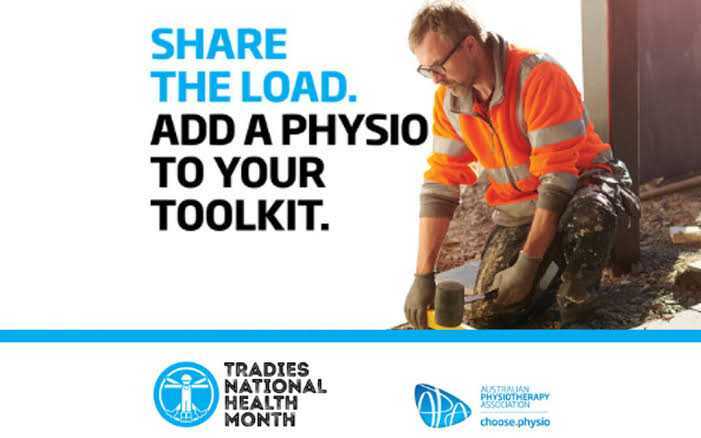August is Tradies health month and our team at My Physio My Health would like to help raise awareness and promote tradie health to ensure good quality of life.
If you’re a tradie and you feel some aches here and there. Fret not as you are not alone, a 2019 Health survey revealed that 60% of tradies experience aches and pains as a result of their job. So if that sounds like you, we encourage you to read on to learn some useful tips from the Australian Physiotherapy Association (2022) and how we can help in reducing and preventing any pain or injury.
Some of the more common tradie injuries that we see are:
- Neck and back pain due to these body parts being utilised a lot when performing labour intensive task
- Shoulder pain due to repetitive reaching or overhead movements
- Knee pain due to repetitive and prolonged bending to the ground , especially during cold weather
- Ankle sprains as there is a lot of walking on or stepping over uneven grounds
So here’s the big question, what can tradies do about it and how can physios help when the niggles or aches come?
At my physio my Health, we believe in a multi-modal approach revolving around hands-on manual therapy, exercise therapy, advice and education, which we will run through below:
- Hands-on manual therapy- including but not limited to massage, dry needling, joint mobilisation or manipulation, taping, trigger point therapy, Ultrasound, shockwave and many more.
- Exercise Therapy with home strengthening or stretching programs, Pilates or hydrotherapy.
- Advise and education-Most of the time, its good to identify the cause of the aches and niggles before it worsens. Therefore, your physio will ask you some questions to figure what might be causing the pain, whether it be wrong postures, tight or weak muscles that weren’t ready for the job, excessive loads or incorrect manual handling. Our physios will help you identify and rectify them.
Despite being careful and doing everything correctly, some of the niggles and injuries are hard to avoid sometimes and will unfortunately happen. Therefore, it’s best to see a physiotherapist early before an issue snowballs into something serious.
Reference: Tradies health - Choose physio | Australian Physiotherapy Association
 WISHING EVERYONE A HAPPY NEW YEAR! WE'VE RETURNED TO OUR REGULAR OPENING HOURS
WISHING EVERYONE A HAPPY NEW YEAR! WE'VE RETURNED TO OUR REGULAR OPENING HOURS

